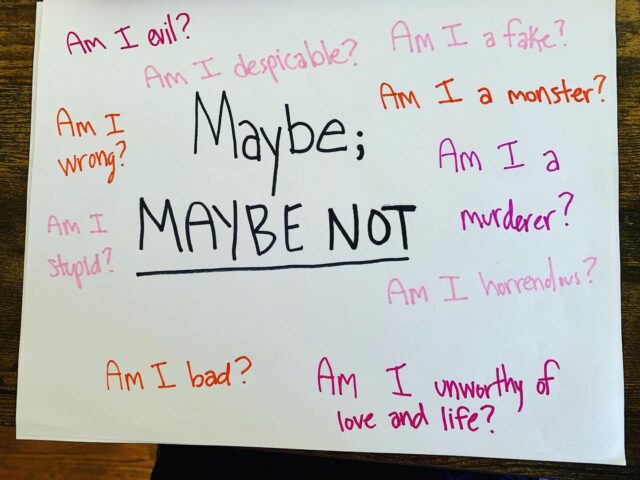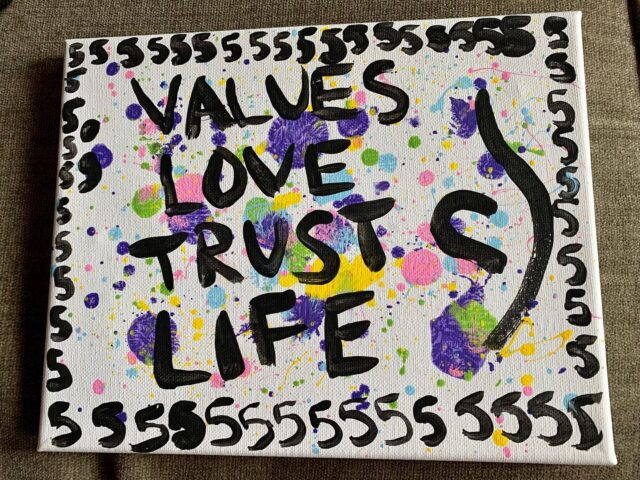
Written by “Birdy,” Age 18
Living with Severe Obsessive Compulsive Disorder: My Story
Six years ago, I wouldn’t have been able to get out of bed. Six years ago, it would have taken me three hours to get ready for school. Six years ago, I would have been tapping and stomping and counting in order to get out of the car, eat a meal, or walk to the bathroom. Six years ago, I never thought I would be where I am today, standing on Middlebury’s campus. My experience with severe obsessive compulsive disorder is not unique to me, but I hope that in sharing my story, others will be able to rejuvenate a sense of hope for their futures, untangled from the vicious chains of their overwhelming fears and anxieties.
I have struggled with severe anxiety and obsessive compulsive disorder for most of my life. And while the obstacles it poses have always been with me, they have ebbed and flowed over time. Six years ago, I was twelve years old and I had never felt so fearful of the life I lived, or what my future may hold. Founded on the fear of becoming sick, my OCD took hold of me until I was immobilized and could no longer function as a human being, let alone do the things I enjoyed the most such as swimming, playing the flute, or spending time at the beach with my sister. My anxiety-ridden obsessions were so overbearing that I was no longer able to complete basic tasks such as eating, sleeping, engaging in personal hygiene, or walking as my compulsions became too intense and overpowering. I was eventually forced to take a leave from school. Stuck in a place of depressional dark anxiety coupled with an ever-spinning wheel of compulsory behavior, I was hopeless.
It became apparent to myself and family that an intervention was needed in order to help me get back on track. We were running out of options. Living in a very rural community increasingly made it difficult to find adequate mental health services, particularly effective for the intensive treatment we soon came to realize I was in need of. Beginning in the spring of 2014, I enrolled in an intensive outpatient program in the Bay Area of California specifically designed for adolescents struggling with severe obsessive compulsive disorder and other anxiety related mental illness. I was lucky enough to have the familial support that allowed me to temporarily move closer to the treatment center in order to complete a ten week intensive program that focused on exposure response prevention therapy, commonly known as ERP. And while the end result was utterly life changing, those weeks, in many ways, may have been the hardest days of my life.
Therapy consisted of progressively working through behavioral changes in order to disassociate fear and obsessive triggers from compulsions. Given the breadth of my individual OCD experience, this was a long process. But every day posed a new challenge, and every day I found myself getting a little bit stronger. Over time, reversing and erasing rituals became easier and easier, and I was beginning to find myself again without the angry mask of my disorder which had haunted me for so long. At the end of treatment, I was able to walk, eat, sleep, study, and go about my day without the overbearing stress of my compulsions. I was able to swim again, return to school and spend time with friends once again. Most importantly though, I was able to smile and laugh and feel something besides fear. I was happy.
Six years later, and I am still that same girl. Even though the severity of my OCD has never returned to the levels it once was, this is not to say that I do not still struggle. As I have grown up, I have noticed my anxiety and OCD manifest in different ways. While the obsession of getting sick may not be a large fear of mine anymore, circumstance lends itself to the power of the mind. In recent years through high school and college, I have struggled with an eating disorder, much tied to my OCD tendencies. And while there are rough and easier patches, my anxiety is still very much a part of who I am. The difference now however, is that I have been to that incredibly dark place. I know what it’s like to feel suffocated by life itself. I know what it’s like to wish everything would just stop, and then maybe finally there would be some peace. And I know what it is like to lose yourself.
I don’t want to say that I have completely overcome obsessive compulsive disorder, because I have come to accept that in whatever way it decides to show itself, it will always be there. But I have learned what it means to be a fighter–what it means to be stronger than fear. I have the tools now to help me challenge intrusive thoughts and heightened anxiety. ERP was the most effective strategy, and I still rely on the cognitive tools my therapists helped me develop when I was in the intensive program. I continue to use practices of mindfulness and visualization which I incorporate into my life through activities such as yoga, journaling, and meditation. Through all of this, I am reminded that honest, open communication is paramount to success. Being able to confide in someone makes a tremendous difference, and I am forever thankful for the relationship I have with my mom, dad, sister, as well as the therapists and clinicians throughout the years for always providing a space for my voice and responding with love and validation.
I used to feel ashamed of my OCD, like it was some tremendous secret I needed to protect. But over time, I have come to realize that I am not defined by a diagnosis. I am not guilty about who I am. My struggles have made me into the woman I am today, and without those experiences, I would not be the person I aspire to love. Confronting OCD at a young age forced me to mature much faster than most, and I am happy to say that coming so far from that dark place has given me the opportunity to appreciate the nuances of life so much more. I have learned to harness the strength to overcome whatever life decides to throw, and I believe, with every part of me, that you do too.
Note: October is National OCD Awareness Month
Read “A Mother’s Story” by Birdy’s mother.
*This story was not solicited by a current patient.




